The Foundation of Healthy Relationships: Communication
Understanding the Importance of Effective Communication
Effective communication acts as the cornerstone of all healthy relationships. It goes beyond simply exchanging words; it is about fostering understanding and mutual respect. Couples who engage in open and honest dialogue build stronger emotional bonds and navigate relationship challenges more effectively. Communication shapes how partners express needs, share feelings, and resolve conflicts, creating a climate of trust and collaboration.
The Role of Emotional Connection
At the heart of communication lies emotional connection. This connection allows partners to feel seen, heard, and valued, which deepens intimacy and satisfaction. Nonverbal cues such as facial expressions, tone of voice, and body language play a crucial role in conveying emotions that words may not fully express. Being emotionally attuned enhances empathy and reduces misunderstandings, reinforcing the partnership’s security and closeness.
Essential Communication Skills for Relationships
Healthy communication is a skillset that couples can cultivate together. Key strategies include active listening — giving full attention and reflecting back what is heard — and using "I" statements to express feelings without casting blame. Practicing empathy helps partners understand each other’s experiences and respond sensitively. Establishing boundaries, having regular meaningful conversations, and employing constructive conflict resolution techniques support sustained relationship quality. These skills not only improve day-to-day interactions but also prepare couples to face difficulties with resilience and compassion.
Core Communication Skills That Elevate Relationships
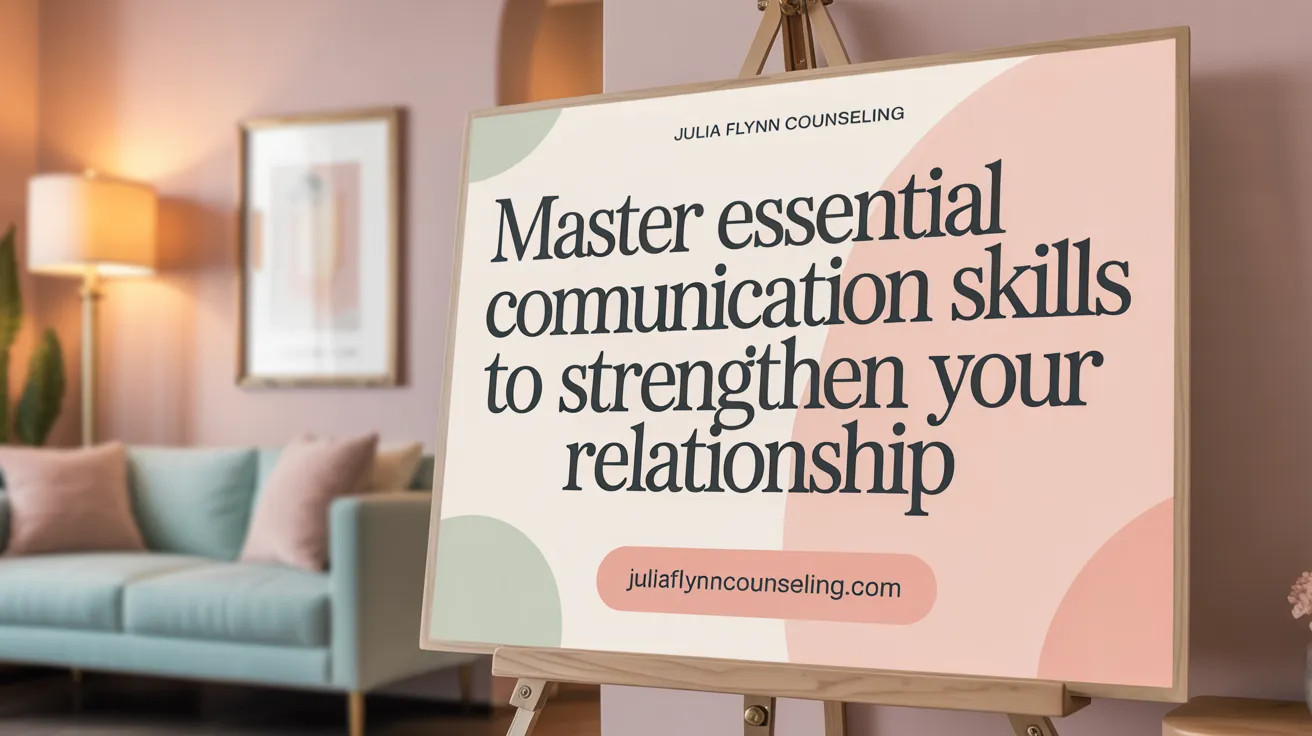
What are essential communication skills that improve relationship quality?
Effective communication is foundational to nurturing and maintaining healthy relationships. Several core skills significantly enhance the quality of interactions between partners:
-
Active Listening: This involves fully focusing on your partner's words, maintaining eye contact, and avoiding interruptions. Active listening techniques also mean reflecting back what you've heard to confirm understanding, which shows respect and validation.
-
Using "I" Statements: Expressing your feelings and needs using "I" statements helps reduce defensiveness and hostility. Instead of blaming, couples communicate their experiences and desires clearly and constructively. See more on Using 'I' statements.
-
Empathy and Assertiveness: Empathy involves genuinely trying to understand your partner's feelings and viewpoints, fostering emotional connection. Assertiveness complements empathy by enabling individuals to express their own needs and boundaries respectfully and confidently. Learn about Empathy in communication and Assertive communication.
-
Healthy Nonverbal Communication: Body language, facial expressions, and tone of voice communicate emotions beyond words. Positive nonverbal cues like open posture, nodding, and appropriate eye contact reinforce verbal messages and build trust. Explore Nonverbal communication cues for further details.
Together, these skills promote open, honest dialogue and help partners navigate challenges effectively while nurturing intimacy and mutual respect.
Identifying and Overcoming Unhealthy Communication Patterns
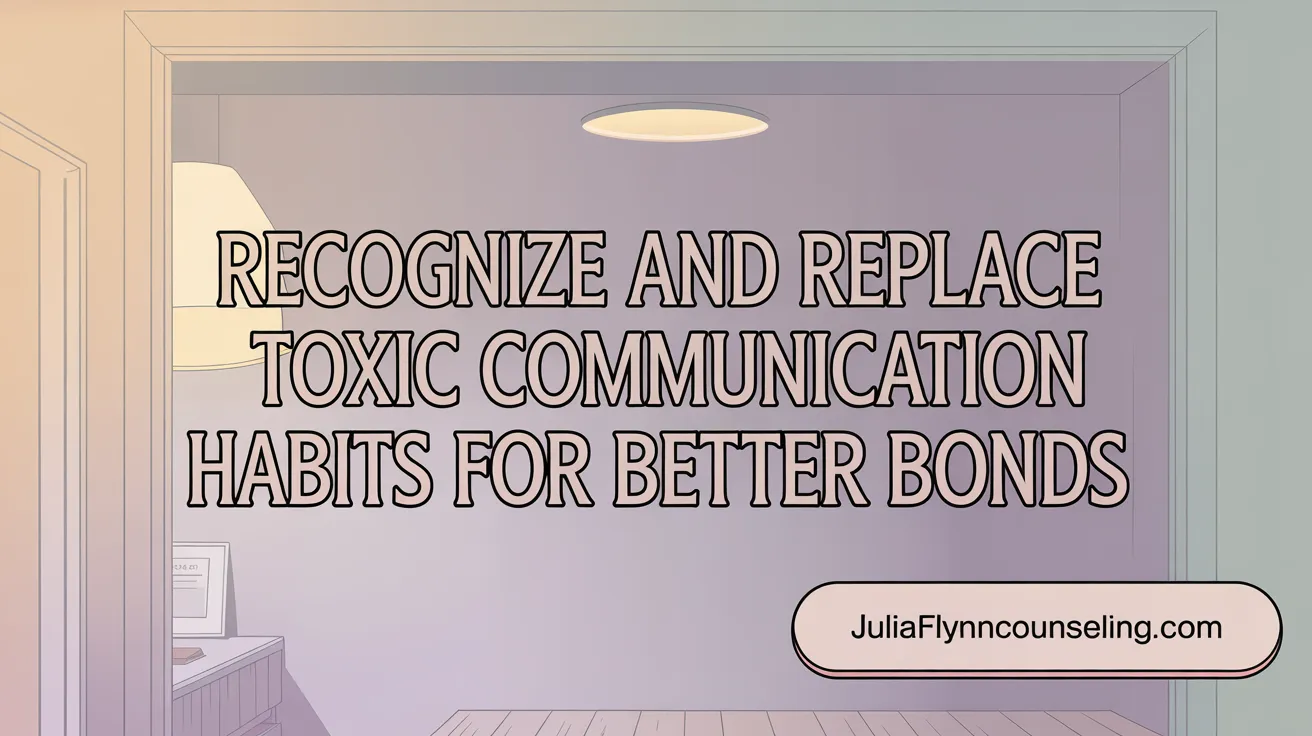
Which communication patterns harm relationships and how can they be addressed?
Certain communication patterns can be particularly destructive to relationships. Common harmful behaviors include criticism, defensiveness, stonewalling, and contempt. These patterns tend to escalate conflicts, erode trust, and create emotional distance between partners. Such unhealthy communication patterns can seriously damage relationship quality.
Criticism involves attacking a partner’s character rather than focusing on specific behaviors, while defensiveness is a way of protecting oneself, often by denying responsibility or counter-attacking. Stonewalling occurs when one partner withdraws and shuts down, preventing resolution. Contempt expresses disrespect and disdain and is the most damaging behavior. Recognizing and managing these behaviors is crucial as outlined in strategies for reducing defensiveness and overcoming criticism in communication.
Impact on relationship health
These destructive patterns contribute to a toxic communication environment that can lead to increased stress, emotional disconnection, and even physiological effects such as raised cortisol levels and cardiovascular reactivity. Over time, they undermine relationship satisfaction and intimacy, making couples vulnerable to ongoing conflicts and dissatisfaction. Research on effects of negative interactions on health and relationship quality highlights these risks.
Strategies to replace with positive habits
To overcome these harmful patterns, partners can adopt several effective strategies:
-
Avoid blame and criticism: Using “I” statements helps express feelings and needs without attacking the partner, reducing defensiveness.
-
Practice active listening: Fully focusing on the partner’s words, maintaining eye contact, and reflecting back what is heard can foster understanding. Detailed active listening techniques reinforce this skill.
-
Use constructive conflict resolution: Techniques such as taking turns to speak, the Speaker-listener method communication, and setting time-outs during conflict can keep discussions respectful and productive.
-
Express empathy and appreciation: Showing gratitude and positive nonverbal cues creates a supportive emotional environment — see expressing appreciation and gratitude strategies.
-
Adopt the “we-talk” approach: Emphasizing shared goals and unity reduces oppositional stances and encourages collaboration as described in the “we talk” communication approach.
Through these methods, couples can rebuild trust and create a healthier communication climate that nurtures emotional intimacy and resilience, in line with healthy communication practices and relationship quality improvement strategies.
The Role of Emotional Intelligence and Self-Awareness in Communication
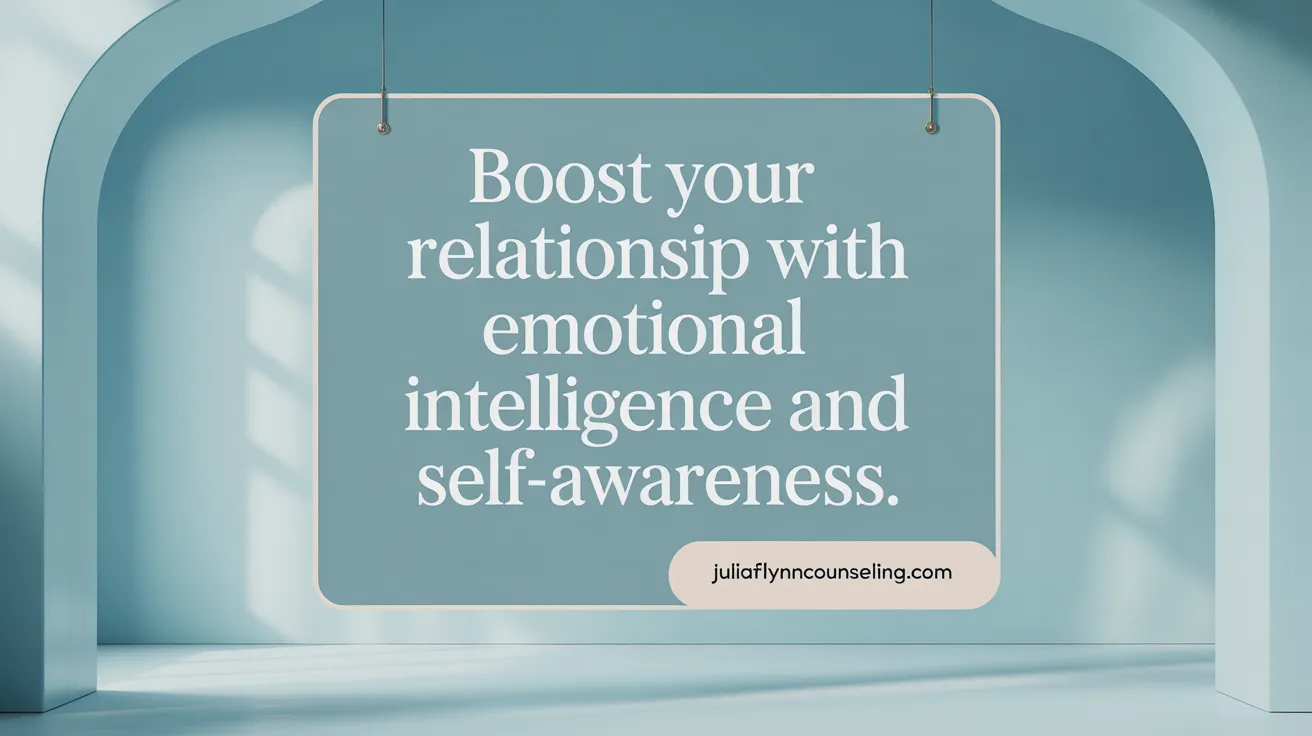
How do emotional intelligence and self-awareness contribute to better communication?
Emotional intelligence plays a critical role in relationship communication by enhancing the ability to understand both one’s own emotions and those of a partner. This understanding allows individuals to regulate their emotional responses rather than reacting impulsively during conflicts, leading to more constructive conversations. For more on Effective Communication in Relationships, see strategies that promote emotional regulation and empathy.
Self-awareness complements emotional intelligence by providing insight into personal values, histories, and needs, including understanding attachment styles that influence relational behaviors. Recognizing these patterns promotes thoughtful and empathetic communication, helping partners feel understood and safe.
Managing nervous system arousal during conflicts is equally important. Awareness of physiological reactions, such as increased heart rate or cortisol levels, helps couples recognize when emotions escalate and intervene with calming strategies or time-outs to prevent conflict escalation and support healthier interactions. Such techniques are detailed in resources on behavioral health strategies for improving communication.
Fostering curiosity and generosity encourages openness and emotional giving without keeping score. This mindset nurtures empathy and warmth, allowing couples to engage with complexity—the ability to hold multiple, sometimes contradictory feelings—thereby deepening understanding and compassion. For approaches to practicing mindful awareness and empathy, see related relationship skills guides.
Together, emotional intelligence and self-awareness create a foundation for regulated, compassionate, and effective communication that strengthens relational bonds and facilitates conflict resolution. For evidence-based practices on enhancing emotional connection and communication, explore integrative couple therapy reviews and communication frameworks that foster emotional connection and empathy.
Nonverbal Communication: Beyond Words in Building Connection
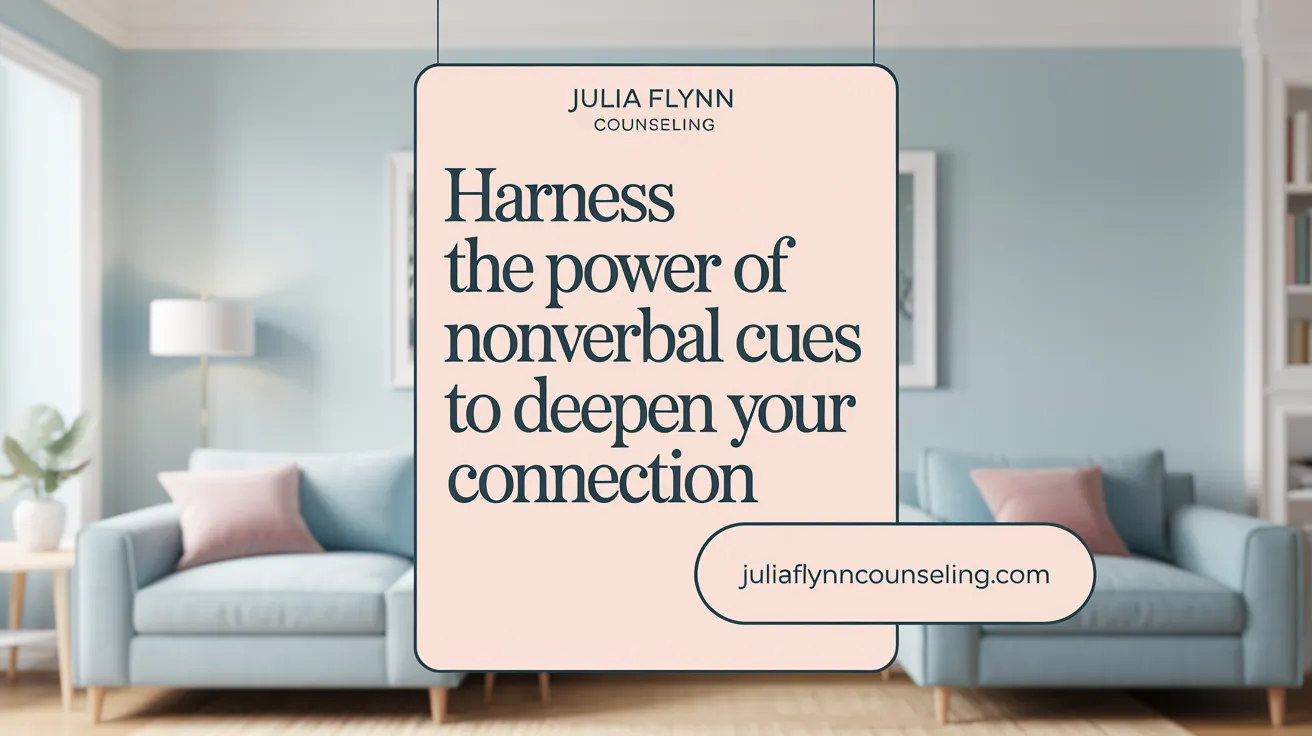
Why is nonverbal communication vital in relationships?
Nonverbal communication plays a crucial role in relationships because it often conveys emotions more powerfully than spoken words. Body language, facial expressions, and tone of voice provide deeper insight into how a partner truly feels beyond what they say. When these nonverbal cues align with verbal messages, they foster clearer understanding, build empathy, and create stronger trust between partners (Effective communication in relationships, Good communication in relationships).
Importance of body language, facial expressions, tone of voice
Subtle signals such as a gentle touch, a sincere smile, or the softness in one’s voice communicate care and attentiveness. These cues often reveal vulnerability, warmth, or frustration before words are spoken. Recognizing and responding to these signs allow partners to connect on an emotional level, enhancing intimacy and support (Nonverbal communication cues, Facial expressions in communication).
Aligning verbal and nonverbal messages
When verbal communication conflicts with nonverbal expressions—such as saying "I'm fine" with a tense face or crossed arms—it can lead to confusion and decreased trust. Consistency between words and nonverbal signals ensures the message is received authentically, promoting openness and reducing misunderstandings (Healthy communication practices, Common communication roadblocks).
Reading partner’s unspoken emotions
Attentive partners notice nonverbal hints that suggest feelings like sadness, anxiety, or excitement, which might not be expressed verbally. This awareness enables timely empathy and reassurance, strengthening the emotional bond and helping navigate challenges sensitively (Empathy in communication, Recognizing different viewpoints).
Impact on empathy and trust
Effective nonverbal communication deepens empathy by allowing each person to sense and resonate with the other's emotional state. Trust grows when individuals feel truly seen and understood, laying the foundation for a resilient, compassionate relationship (Building trust and security, Trust and collaboration in couples therapy).
By actively tuning into nonverbal cues and ensuring harmony with spoken words, couples cultivate a richer, more meaningful connection, helping them thrive together emotionally and relationally (Enhancing Emotional Intimacy, Maintaining curiosity and intimacy).
Constructive Conflict Resolution Strategies for Stronger Bonds
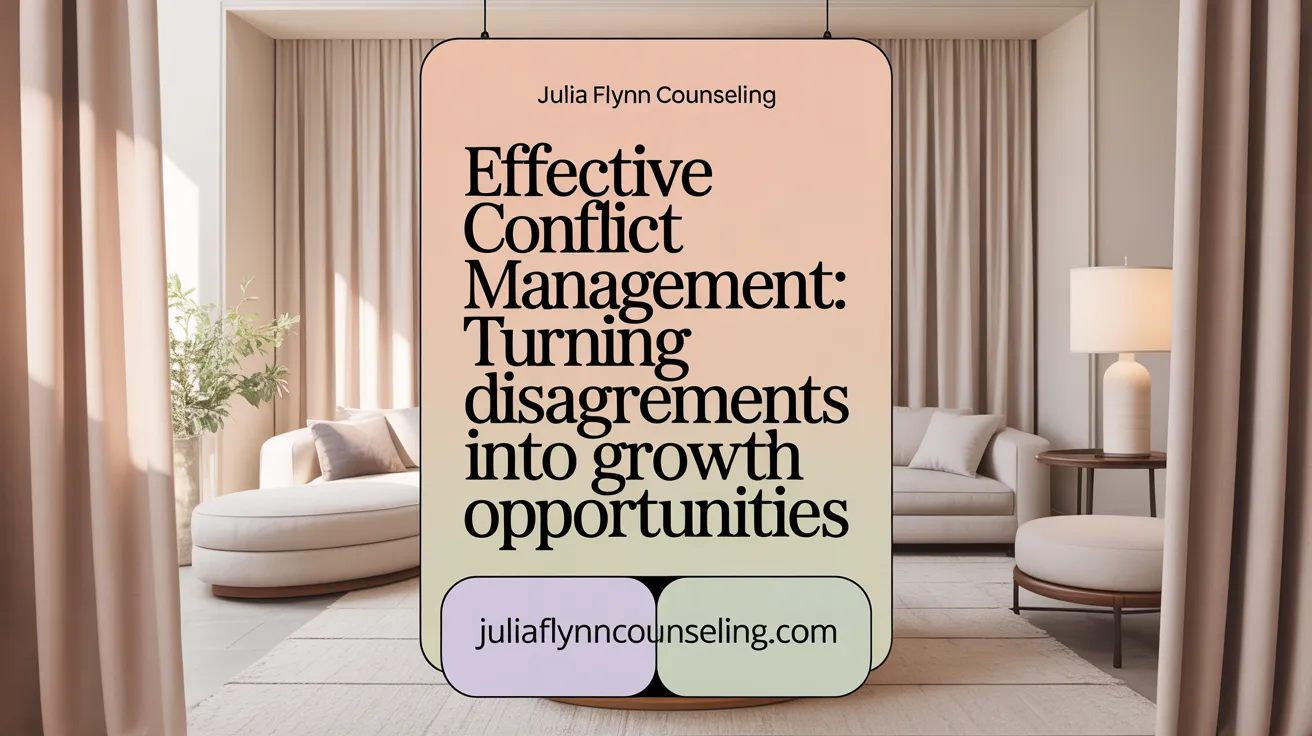
What are effective ways to manage conflicts in relationships?
Effective conflict management is essential to maintain and strengthen bonds in relationships. One crucial strategy is using time-outs to de-escalate heated moments. When emotions run high, taking a pause allows both partners to cool down, preventing escalation and enabling more productive conversations later.
Soft start-ups are another important method. Initiating discussions gently and avoiding blame reduces defensiveness and opens space for understanding. Using "I" statements instead of accusatory language encourages openness.
The LARA method—which stands for Listen, Affirm, Respond, and Add—helps partners stay engaged and empathetic. This approach encourages active listening, validating feelings, thoughtful response, and contribution to the dialogue, promoting constructive exchange.
Successful resolution often depends on negotiating and compromising rather than trying to "win" arguments. Viewing conflict as a problem to solve together fosters cooperation and mutual respect.
Finally, expressing appreciation during conflicts can soften tension. Recognizing each other’s efforts and positive traits even in disagreement nurtures goodwill and emotional connection.
Incorporating these conflict resolution strategies helps couples navigate challenges with respect and care, reinforcing trust and intimacy over time.
The Power of Regular and Intentional Communication Check-Ins
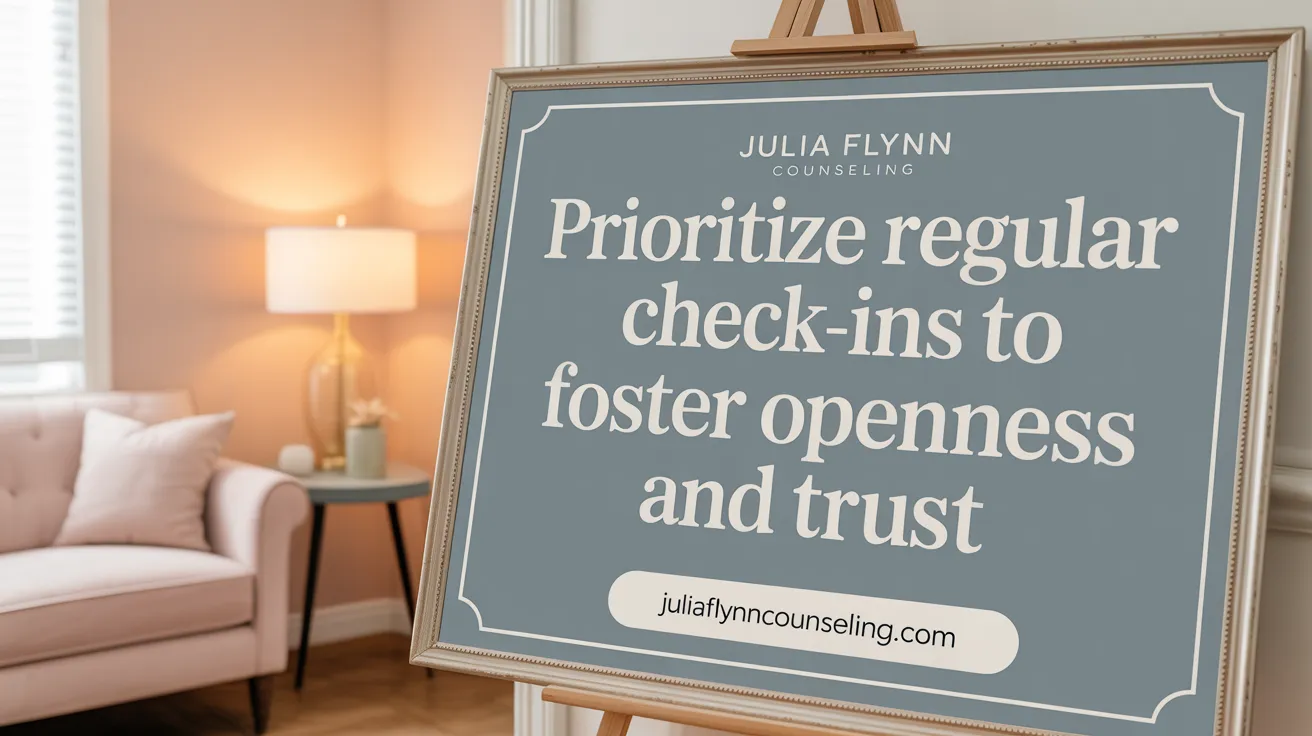
Scheduling Dedicated Time for Conversation
Setting aside specific times for communication, such as weekly check-ins or 'Bae Sesh', creates a safe, distraction-free space where partners can focus fully on each other. This intentional scheduling reinforces the importance of the relationship and prioritizes open dialogue. For more insights, see Scheduled relationship check-ins and Couples meetings.
Benefits of Mutual Sharing and Listening
Regular check-ins encourage both partners to share their thoughts and feelings and to listen attentively. This mutual exchange builds emotional intimacy and trust, ensuring both voices are heard equally and reducing feelings of neglect or misunderstanding. Learn more about Effective communication in relationships and Active listening techniques.
Discussing Needs Clearly
Clear communication during check-ins involves expressing personal needs using “I statements,” which minimize defensiveness and foster understanding. Being specific about needs helps prevent assumptions and supports more effective problem-solving. Explore Effective communication in relationships and Assertiveness in relationships.
Using Open-Ended Questions
Asking open-ended questions invites deeper conversation and encourages partners to explore their emotions and experiences more fully. This approach promotes curiosity and empathy, revealing underlying concerns and strengthening the emotional bond. See Asking open-ended questions and Practicing active listening.
Preventing Misunderstandings and Resentment
Regularly discussing feelings and expectations helps identify potential misunderstandings before they escalate. Open dialogue during check-ins can prevent the buildup of resentment and promote ongoing connection and cooperation. For strategies on Preventing misunderstandings in communication and Healthy communication practices.
How Do Regular Check-Ins Improve Relationship Communication?
Scheduled check-ins provide safe, distraction-free environments for both partners to share feelings and needs openly. Utilizing open-ended questions encourages deeper conversation, promotes understanding, prevents assumptions, and fosters ongoing connection and trust. Discover more about Healthy communication practices and Active listening techniques.
Building Compassion and Responsiveness: Keys to Relationship Satisfaction

How does partner responsiveness influence relationship quality?
Partner responsiveness refers to perceiving your partner as attuned and supportive to your needs and emotions. This perception plays a vital role in fostering feelings of closeness, satisfaction, and commitment within relationships. When partners feel truly heard and validated, the emotional bond strengthens, creating a secure and trusting connection (Perceived partner responsiveness).
Compassionate versus self-image goals
Individual goals influence how responsiveness manifests. Compassionate goals drive partners to act with warmth, sensitivity, and genuine care, boosting responsiveness and encouraging mutual support. In contrast, self-image goals focus on maintaining a favorable impression, often at the expense of emotional openness. Such goals tend to reduce responsiveness, fuel conflicts, and diminish relationship satisfaction (Interpersonal goals in relationships.
Mutual support and emotional safety
Responsiveness is a dynamic, reciprocal process that relies on both partners projecting and perceiving care and understanding. This continuous exchange fosters emotional safety—a cornerstone for healthy intimacy. When partners consistently respond to one another's vulnerabilities with empathy and support, it cultivates a nurturing environment where both feel valued and secure (Building trust and security).
Impact on relationship quality and commitment
Research shows that higher levels of perceived partner responsiveness correlate with increased relationship commitment, satisfaction, and overall quality. This extends beyond momentary interactions, influencing long-term relational development. Fostering compassionate goals not only improves current responsiveness but also initiates a positive spiral that promotes enduring emotional connection and partnership resilience (Responsiveness and relationship quality.
Integrating Evidence-Based Therapies to Improve Communication
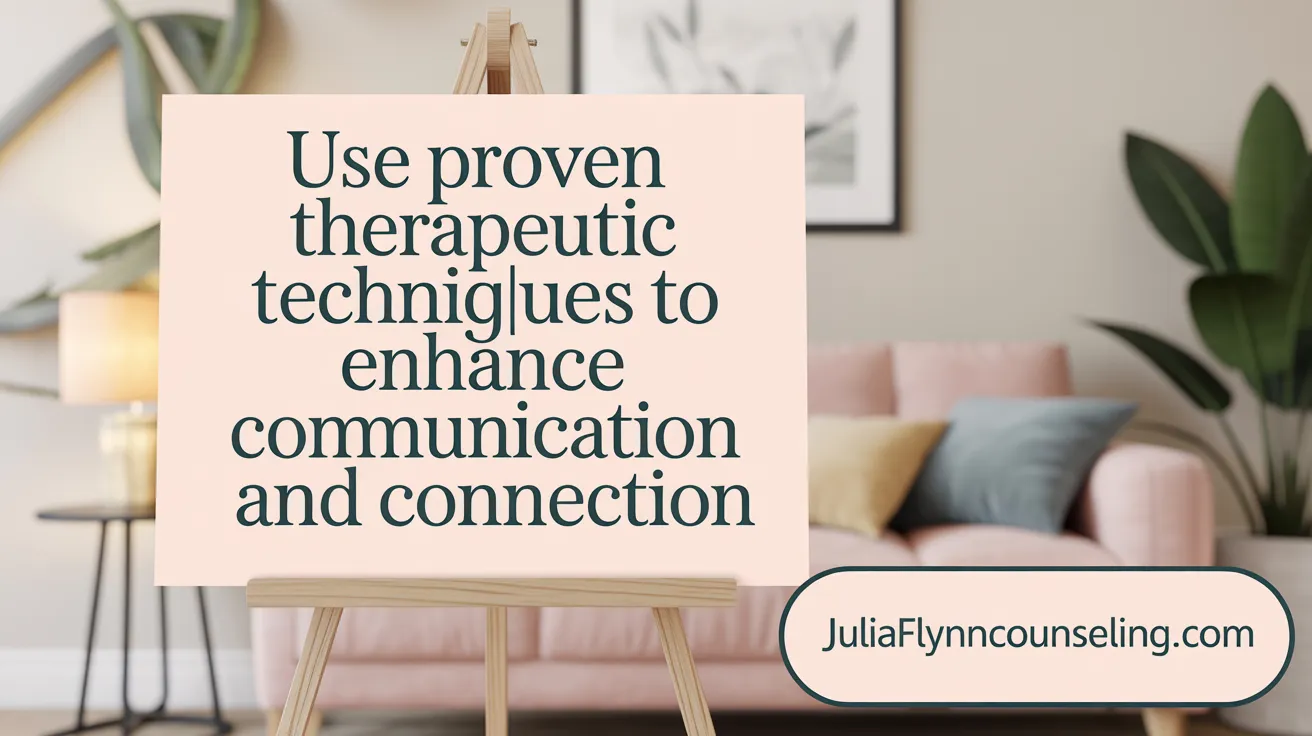
What evidence-based therapies help improve communication and relationship quality?
Evidence-based couples therapies have been shown to significantly enhance communication and strengthen relationships through scientifically supported techniques. Learn more about evidence-based couples therapy approaches.
Emotionally Focused Therapy (EFT)
EFT centers on recognizing and healing attachment injuries between partners, helping create secure emotional bonds. It guides couples in accessing and expressing vulnerable emotions, fostering trust and intimacy. Structured phases include de-escalation of conflict, restructuring emotional responses, and consolidating emotional connection for long-term relationship repair. For detailed insights, see Emotionally Focused Therapy (EFT) and emotional intimacy.
Integrative Behavioral Couples Therapy (IBCT)
IBCT combines behavioral and cognitive strategies emphasizing acceptance and acceptance-based change. Couples learn to identify and accept differences, reduce negative patterns, and increase positive interactions. Techniques include empathic joining, externalizing problems, role-playing, and planned desensitization. This improves kindness and understanding while addressing communication flaws. Explore more about Integrative Behavioral Couples Therapy (IBCT).
Cognitive-Behavioral and Acceptance Commitment Therapy
These approaches focus on modifying communication behaviors and thought patterns detrimental to relationships. Acceptance Commitment Therapy (ACT) in couples counseling enhances emotional flexibility, accepting difficult emotions without defensiveness while promoting values-driven behaviors. Cognitive-Behavioral methods provide tools for emotion regulation, effective problem-solving, and clear communication. Learn about Integrative Cognitive Behavioral Therapy (CBT) and ACT.
Techniques for Emotional Bonding, Acceptance, and Conflict De-escalation
Common across these therapies are skills such as:
- Expressing empathy and vulnerability
- Utilizing "I" statements to reduce blame
- Engaging in structured dialogues to prevent escalation
- Creating safe spaces for emotional disclosure
- Developing shared goals and mutual acceptance
Together, these methods nurture emotional responsiveness, rebuild trust, and create productive communication patterns essential for healthy, satisfying relationships. For more strategies on improving communication, see effective communication in relationships.
Practical Communication Exercises to Strengthen Relationship Bonds

What specific exercises can couples practice to enhance communication?
Couples can practice a variety of targeted exercises to improve their communication and deepen their connection. One foundational practice is active listening with mirroring, where one partner listens attentively and then paraphrases what the other has said to ensure understanding without judgment or interruption. This encourages openness and validation.
Using ‘I’ statements is another powerful exercise. Partners express their feelings and needs from their own perspective, avoiding blame or criticism. For example, stating "I feel hurt when..." helps reduce defensiveness and fosters clearer expression.
Stress-reducing conversations focus on discussing external pressures or daily stressors that affect the relationship. This type of dialogue promotes a sense of 'we-ness' and helps partners support each other amid challenges.
Expressing gratitude regularly is an effective way to enhance positivity. Simple actions like sharing appreciation for small acts or traits contribute to a warmer emotional climate.
Finally, regular check-ins and reflective dialogues—whether daily or weekly—provide safe spaces to share feelings, clarify needs, and maintain emotional intimacy. These scheduled conversations prevent misunderstandings and help partners stay connected despite busy lives.
Together, these exercises create a resilient communication foundation, supporting both emotional safety and relationship satisfaction.
Seeking Help: When and How Professional Support Benefits Communication
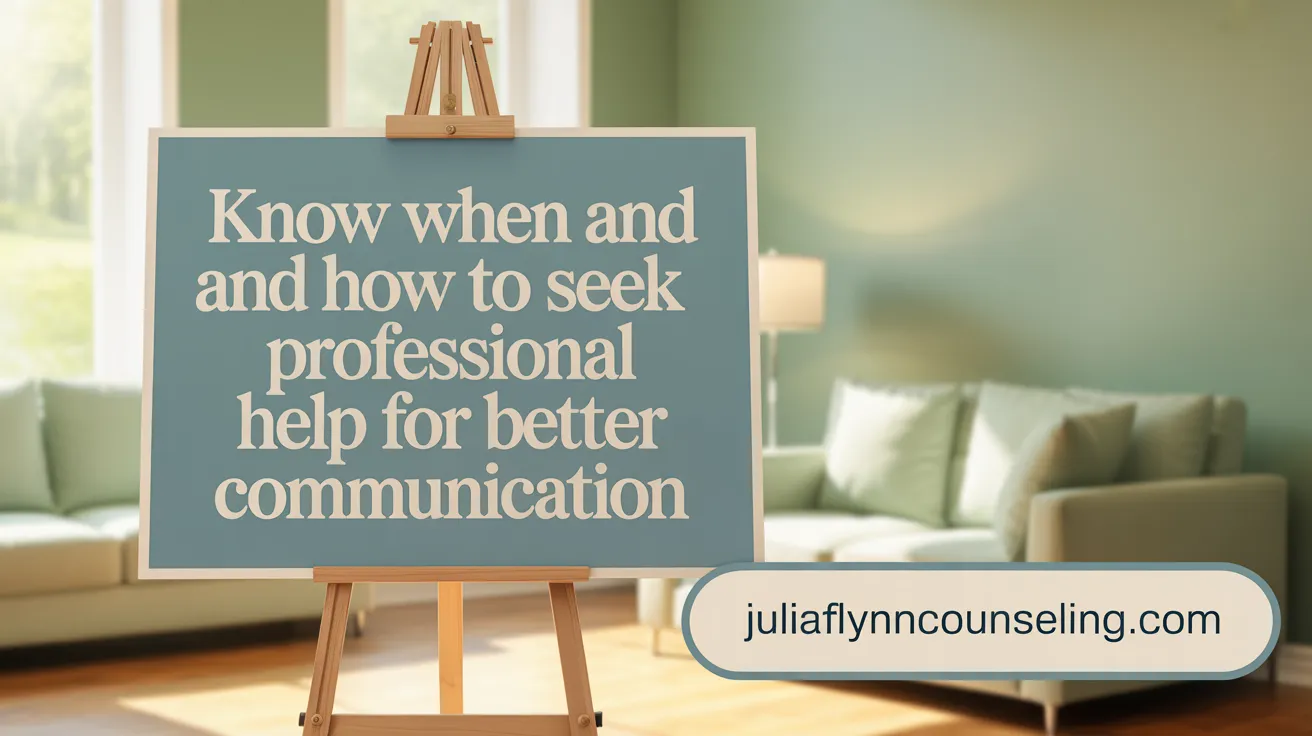
When should couples seek professional help to improve communication?
Communication struggles that persist over time, escalate conflicts, create emotional distance, or lead to unresolved issues signal the need for professional support. Seeking counseling is beneficial when couples find themselves repeatedly caught in negative patterns or unable to resolve disagreements despite efforts (Improving Communication in Relationships, Improve Communication Skills in Relationships).
The role of couple therapy and counseling
Couple therapy offers structured guidance to improve communication skills, manage conflicts effectively, and rebuild emotional connection. Therapists help partners understand underlying issues, clarify values, and develop empathy—strengthening trust and intimacy. Evidence-based approaches like Emotionally Focused Therapy (EFT), Integrative Behavioral Couple Therapy (IBCT), and other evidence-based couples therapies have demonstrated long-term improvements in relationship satisfaction and communication (Evidence-Based Couples Therapy).
Modern therapeutic approaches and accessibility
Contemporary couple therapy is increasingly accessible, with telehealth in couple therapy options through video sessions enhancing convenience. Therapists use integrative tactics tailored to the couple’s unique needs, incorporating techniques from multiple frameworks focused on emotional safety, positive interaction, and conflict resolution (Couples Counseling Benefits and Methods).
Importance of early intervention
Addressing communication problems early prevents entrenched negative cycles and emotional disengagement. Early intervention equips couples with constructive communication tools and promotes resilience. It also reduces risks of mental health challenges tied to relationship distress (Importance of Early Intervention in Relationships, Managing Conflict in Relationships.
Professional help provides a supportive space for partners to repair communication, foster mutual understanding, and strengthen their bond for lasting relational health (Healthy Communication in Relationships, 10 Expert Communication Strategies.
Sustaining Strong Relationships Through Ongoing Communication
Continuous effort and practice
Healthy communication is not a one-time achievement but a continuous effort that requires practice and mutual commitment. Couples benefit from dedicating regular time to engage in meaningful conversations, such as weekly check-ins or couple meetings, which help prevent misunderstandings and reinforce emotional connection. Communication skills like active listening, using “I” statements, and expressing appreciation should be practiced consistently to nurture a positive relational atmosphere.
Balancing self-awareness and empathy
Sustaining connection involves balancing self-awareness—understanding your own feelings and needs—and empathy towards your partner’s experiences. Being mindful of your emotions and nervous system responses allows for more constructive dialogue, reducing reactivity. Coupling this with empathy enables partners to listen deeply and respond sensitively, fostering mutual understanding and emotional safety.
Building trust and intimacy
Trust grows when partners keep their commitments to open, honest communication and demonstrate reliability through empathic responses. Sharing vulnerabilities and practicing compassionate goals helps create secure emotional bonds. Expressing gratitude and celebrating positive shared memories reinforce intimacy and create an environment where both partners feel seen, respected, and emotionally fulfilled.
Long-term benefits of healthy communication
Couples who maintain healthy communication patterns experience greater satisfaction, reduced conflicts, and stronger resilience during challenges. Research shows that these couples enjoy better overall well-being and increased relationship stability. Over time, ongoing positive interactions build a foundation of safety and trust that supports deep connection and intimacy, contributing to a lasting healthy partnership.
